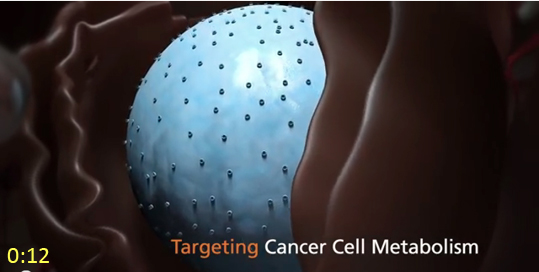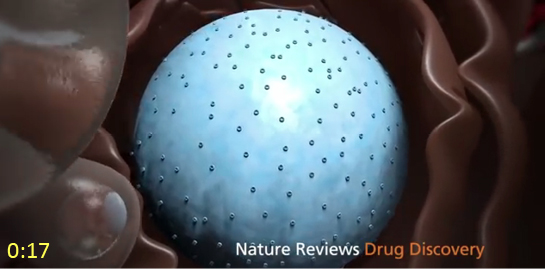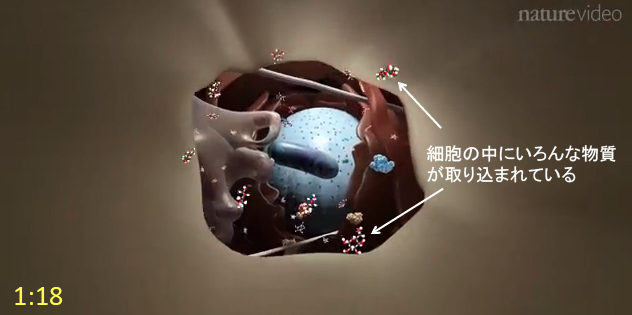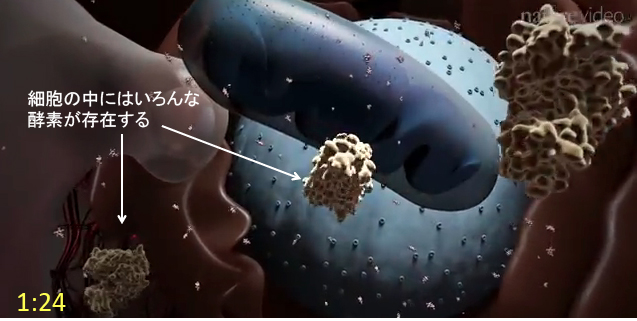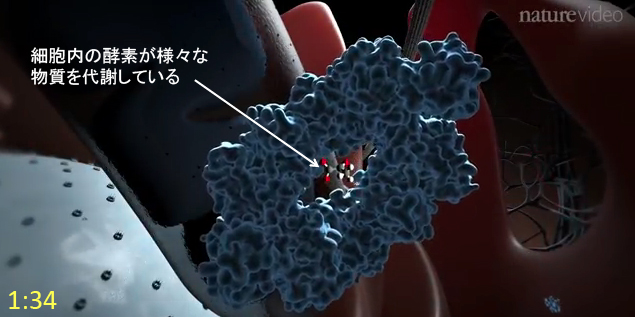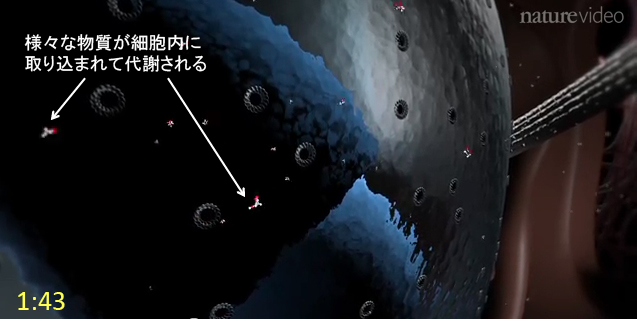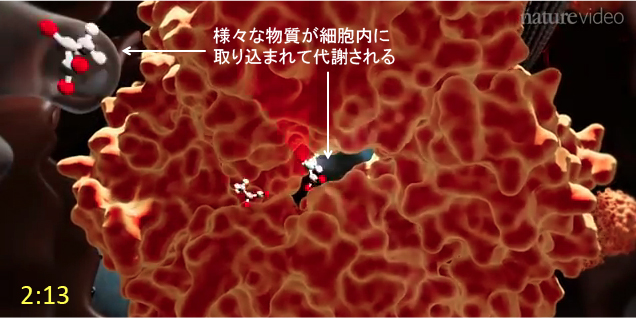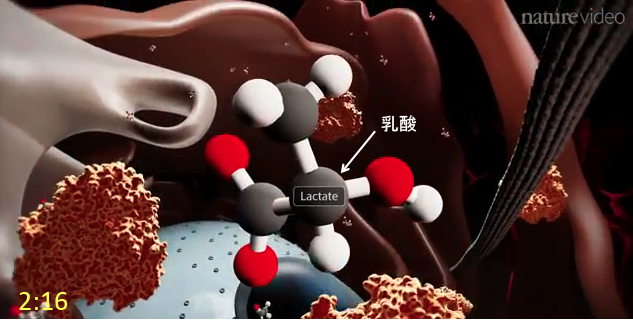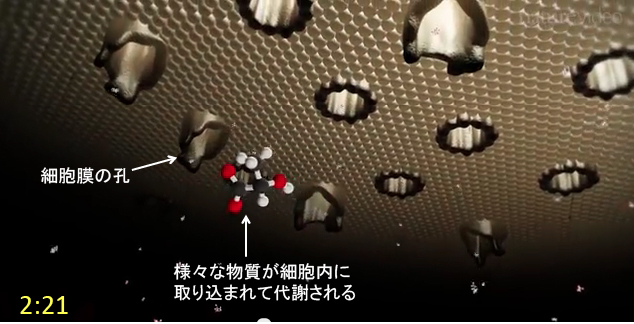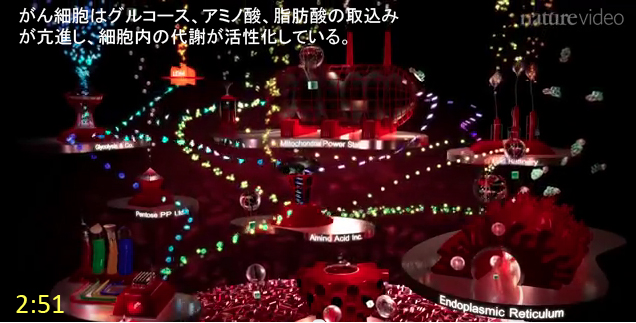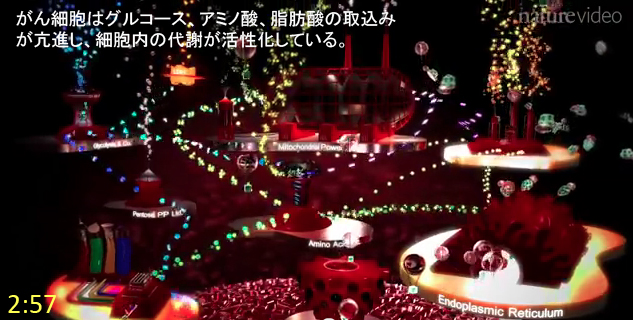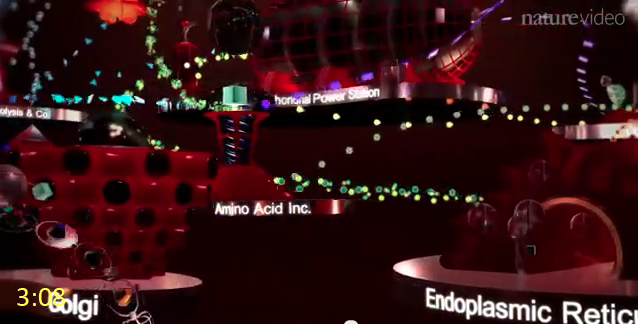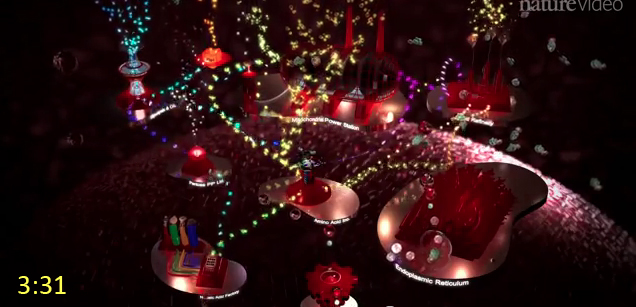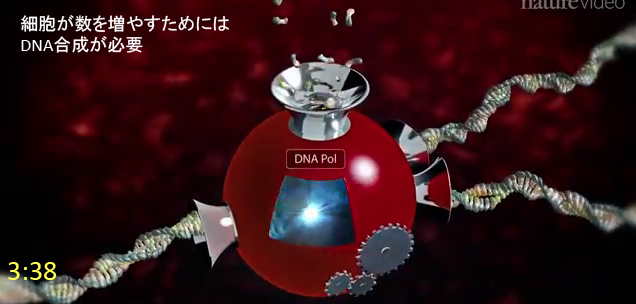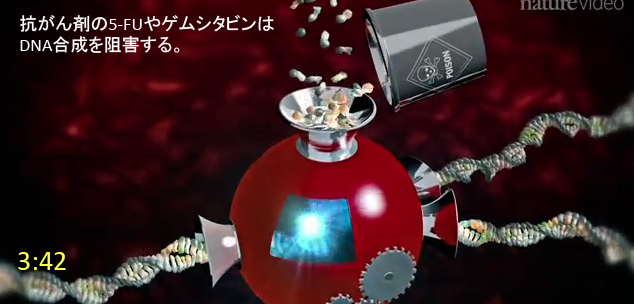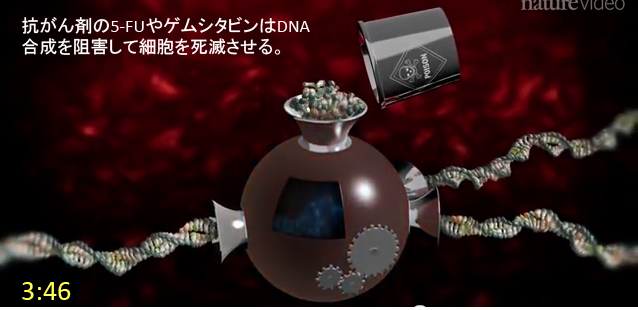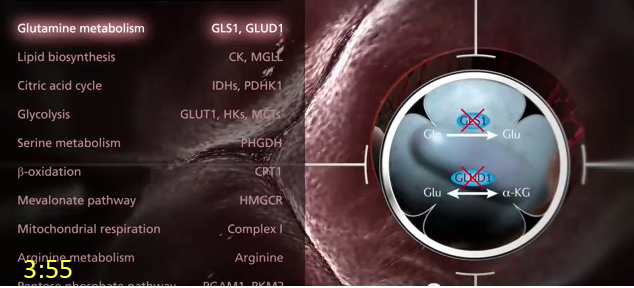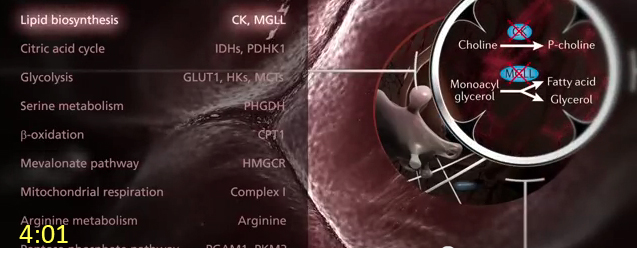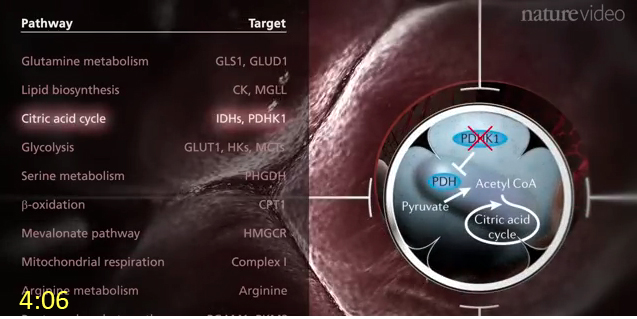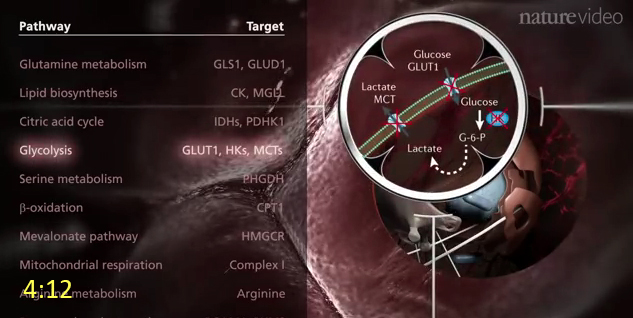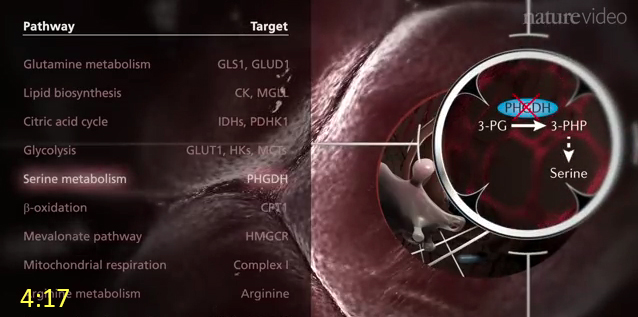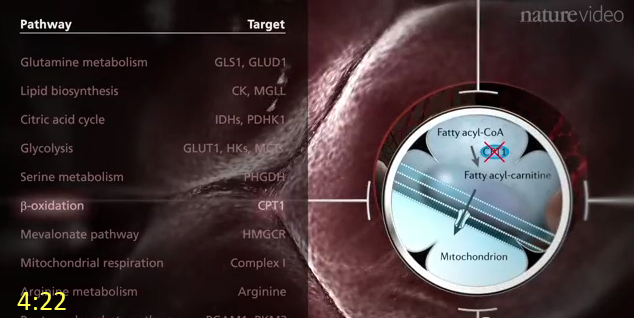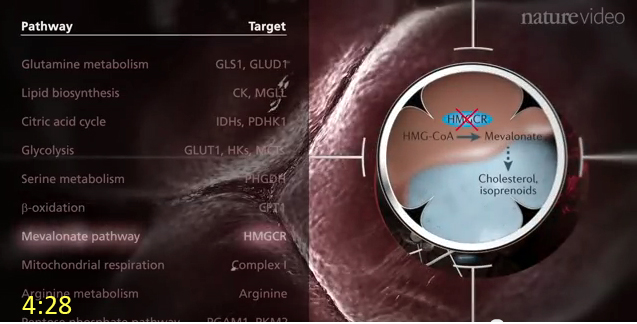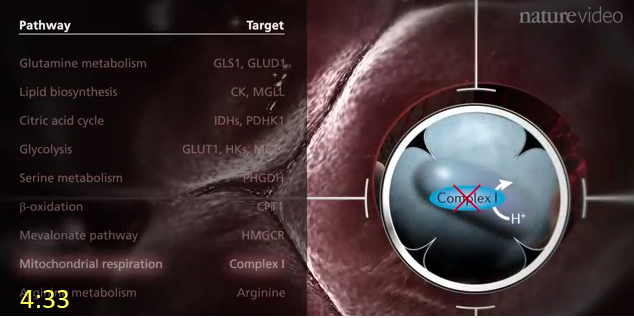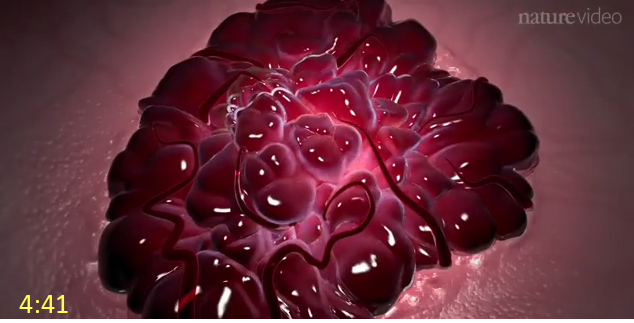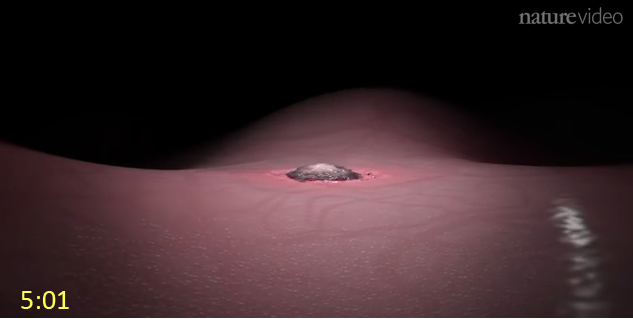|
Targeting Cancer Cell Metabolism: Nature Review Drug Discovery
Animated by Arkitek Scientific
|
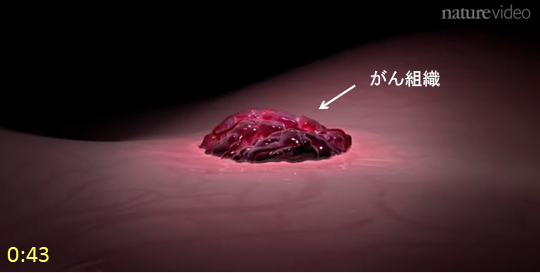 |
0:36
がんは細胞の無制限の増殖によって生じる。
(Cancer is caused by the uncontrolled proliferation of cells.)
0:41
急速な増殖と細胞分裂を可能にするため、栄養素の摂取を増やし、細胞構成成分を作るための需要を満たすため、がん細胞は飢えている。 (Cancer cells are hungry in order to meet their demand for the nutrients and cellular building blocks that enable them to grow and divide rapidly. )
|
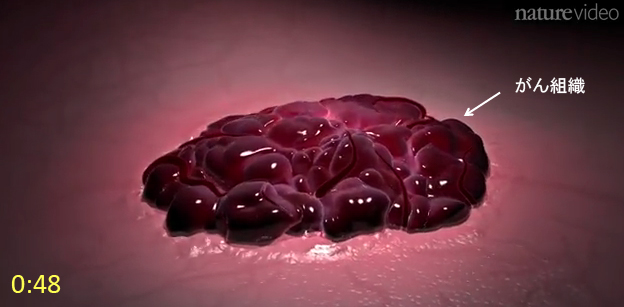 |
0:51
がん細胞の代謝は変化している。
(Their metabolism changes.)
0:53 このようながん細胞における代謝の変化に関する検討は、がん細胞の代謝の特徴をターゲットにした医薬品の開発における関心を高めている。
(New insights into these processes have sparked interest in developing drugs that target the unique metabolic characteristics of cancer cells. )
|
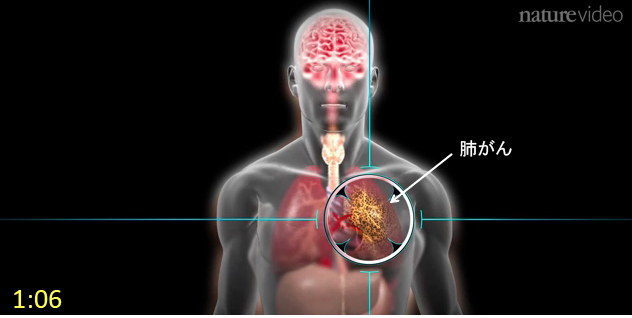 |
1:02
そのような医薬品は、正常細胞には比較的作用を及ぼさずに、多くの異なる組織から発生するがんを治療できる可能性を持っている。
(Such drugs have the potential to treat cancers arising from many different tissues while leaving normal cells relatively unaffected.)
|
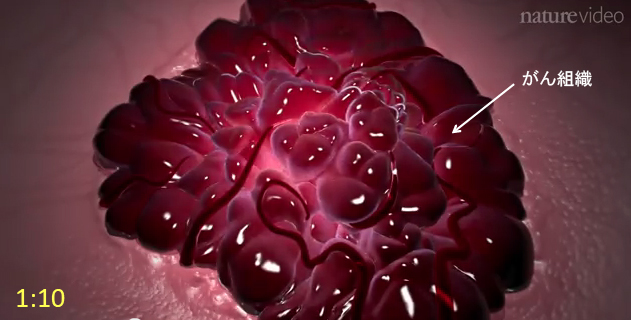 |
1:09
がん細胞における代謝の変化として、グルコースやグルタミンのような栄養素の取込みの亢進がある。
(The altered metabolism of cancer cells includes an increased uptake of nutrients such glucose and glutamine.)
|
|
1:17
さらに、がん細胞はワールブルグ効果と呼ばれる、正常細胞とは少し異なる方法でグルコースを代謝する。
(Also they start to metabolize glucose in a slightly different way, a phenomenon called the Warburg effect.)
|
|
1:25
全ての細胞でグルコースは数段階の過程を経てピルビン酸に分解される。
(In all cells glucose is broken down in several steps to pyruvate.)
|
|
1:33
正常細胞においては、ピルビン酸の多くは、効率的なエネルギー産生工場として働くミトコンドリアのクエン酸回路で代謝される。
(In normal cells, most of the pyruvate enteres the citric acid cycle in the mitochondria which effectively act as the energy factories of the cells.)
|
|
1:44
このようにして、細胞に取り込まれたグルコースの多くは、完全に分解(酸化)されて二酸化炭素になる。
(In this way, most of the glucose that is taken up is completely oxidized to carbon dioxide.)
|
|
1:51
1920年代に、オットー・ワールブルグは、がん細胞は正常細胞と異なり、酸素が十分に利用できる状況でも、酸素を使わない代謝系でグルコースを分解していることを発見した。
(In the nineteen twenties, Otto Warburg discovered that cancer cells, unlike most healthy cells, metabolize most of their glucose using biochemical pathways that do not require oxygen regardless of whether oxygen is available.)
|
|
2:06
がん細胞はグルコースを多く取り込み、正常細胞と同様に、ピルビン酸まで分解する。
(Excess glucose is taken up and like in normal cells broken down to pyruvate.)
|
|
2:11
しかしながら、がん細胞では、ピルビン酸はクエン酸回路に入らずに、多くのピルビン酸は乳酸に変換されて細胞外に放出される。
(However, instead of entering the citric acid cycle, most of the pyruvate is converted to lactate which is secreted from the cell.)
|
|
2:20
グルコースからのエネルギー産生において、なぜがん細胞が非効率的な方法を使っているのかという理由は、まだ結論が出ていない。
(It is still controversial why tumor cells employ this relatively inefficient way of extracting energy from glucose.)
|
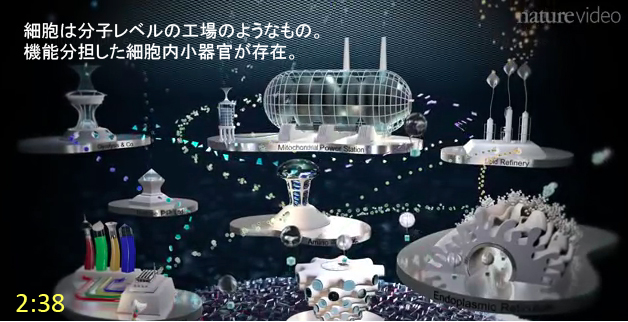 |
2:28
一つの仮説は、がん細胞が細胞を増やすために必要な細胞構成成分を作るために、そのような代謝系に変化しているという考えである。
(One theory is that the process reflects a metabolic program that cells used to convert nutrients into the building blocks of macromolecules.)
|
 |
2:36
細胞は分子レベルの工場のようなものであり、がん細胞では解糖系以外にも様々な変化が起こっている。
(Cells can be viewed as molecular factories and glycolysis is not the only aspect of the cells metabolism that resulted in cancer cells.)
|
|
2:46
急速な細胞増殖を支えるために、がん細胞ではタンパク質や核酸や脂質の合成が亢進しており、代謝は異化(catabolism)から同化(anabolism) にシフトしている。
(Cancer cells undergo a general shift from catabolic to anabolic metabolism in order to produce the greatly increased amounts of proteins, nucleic acids and lipids they need to support their high rates of proliferation.)
|
|
3:01
がん細胞はアミノ酸の取込みも亢進している。
(Cancer cells also take up amino acids.)
|
|
3:05
アミノ酸の中でも、特にグルタミンが重要である。
(Amonfst these, glutamine is of particular importance.)
|
|
3:08
グルタミンは、ヌクレオチドや別のアミノ酸の合成に必要な窒素の供給源となっている。
(It acts as a key source of nitrogen which is required for nucleotide and new amino acid synthesis.)
|
 |
3:15
ある種のがん細胞では、グルタミンはクエン酸回路の代謝産物の補充に必要な炭素源としても重要な役割を担っている。
(In some cancer cells, glutamine also acts as a critical source of carbon which is required for replenishing the components of the citric acid cycle.)
|
|
3:23
市場にある抗がん剤の多くも、代謝をターゲットにしている。しかしながら、それらの抗がん剤の代謝系におけるターゲットは、薬が開発されてからかなりの時間を経てから明らかになった。
(Many anti-cancer drugs on the market have metabolic targets in the cells, although for a large proportions of them the metabolic target was only recognized long after the drug was developed.)
|
|
3:35 例えば、広く使用されている抗がん剤の5−フルオロウラシルやゲムシタビンはDNA合成過程を阻害する。
(For example, widely used chemotherapy drugs 5-fluorouracil and gemcitabine interefere with DNA synthesis.)
|
|
|
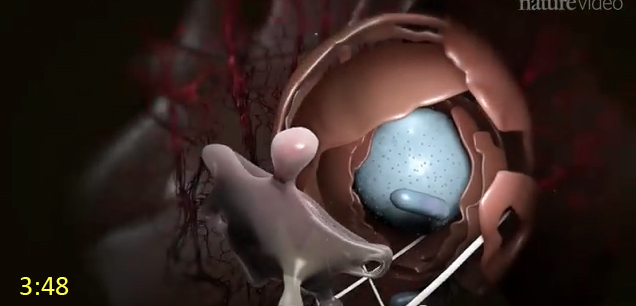 |
3:45
がん細胞の代謝における様々な過程をターゲットにして、医薬品の開発において多くのアプローチが試みられている。
(Today there are a multitude of approaches in development that targets different aspects of cancer cell metabolism.)
|
|
3:52
例えば、研究者は、炭素と窒素の供給を阻止することによってグルタミンの代謝を阻害する治療法を研究している。
(For instance, scientists are exploring the possibility of blocking glutamine to interrupt the supply of carbon and nitrogen.)
|
|
4:01
彼らは、細胞構成成の合成に必要な栄養素の使用を制限する他の酵素をターゲットにすることも検討している。
(They are also considering other enzyme targets that might limit the use of nutrients to make key building blocks.)
|
|
4:08
オットー・ワールブルグが述べているようなグルコース代謝と乳酸産生の亢進を阻害する治療法も検討されている。
(Some strategies are aimed at interfering with the high rate of glucose metabolism and lactate secretion as described by Otto Warburg.)
|
|
|
4;16
がん細胞の代謝をターゲットにしたがん治療法の開発は、多くの問題に直面している。
(Anti-cancer approaches targeting tumor metabolism face many challenges.)
|
|
4:22
主なものとして、正常組織への毒性を予防するために治療濃度域(therapeutic window )に関する検討である。
(A major one is finding the therapeutic window to prevent toxicity to normal tissues.)
|
|
4:27
しかしながら、がん細胞はある特定の代謝経路に依存するように遺伝子レベルでの異常を起こしているので、その代謝系は治療のターゲットになることが明らかになっている。
(However, it’s become clear that the genetic changes associated with cancer can create addictions to specific metabolic pathways which can be therapeutically exploited.)
|
|
4:38
さらに、がん細胞は細胞周期チェックポイントの機能欠損のための、正常細胞より代謝系の維持に敏感である。
(Moreover, cancer cells can be more sensitive to metabolic preservations than normal cells due to the loss of cell cycle checkpoints.)
|
|
4:47
細胞のがん化に関与する遺伝子異常が代謝にどのように変化を及ぼすかを明らかにすることは、がん治療のターゲットになる酵素が酵素の組合せを同定する上で役にたつ。
(A better understanding of how metabolism altered in specific genetic context that lead to cancer will help sicentists identify enzymes or combinations of enzymes to target for intervention.)
|
|
|
4:59
そして、より有効性の高い抗がん剤の開発につながる。
(And hopefully allow the creation of more effective anti-cancer drugs.)
|
|
